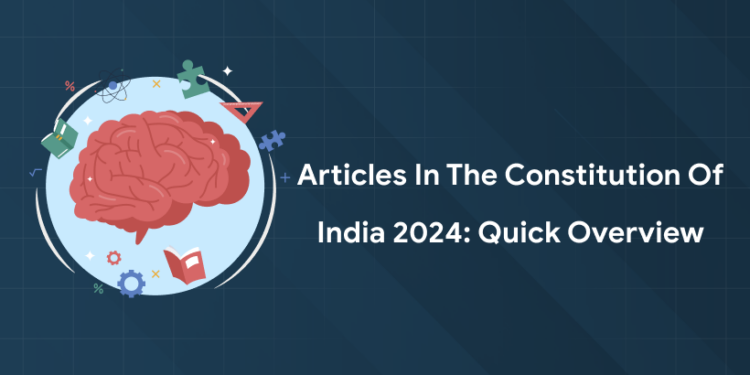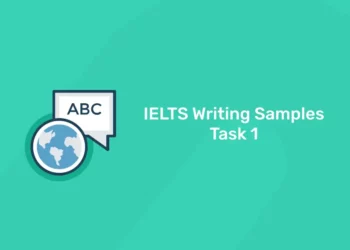Table of Contents
Get a quick overview of the articles in the Constitution of India! The Indian Constitution is the longest written constitution in the world. Initially, it consisted of 395 articles, 22 parts, and 8 schedules. Today, it has expanded to 478 articles, 25 parts, 12 schedules, and 5 appendices.
Derived from the Government of India Act 1935, it has seen 104 amendments, with the latest in 2020 to extend reservations for SCs and STs in the Lok Sabha and state assemblies. The Constitution is a key subject in competitive exams, particularly for civil services. In this article, we will discuss important constitutional articles.
Articles in the Constitution of India
Firstly let’s take a look at the preamble of Indian Constitution-
“WE, THE PEOPLE OF INDIA, having solemnly
resolved to constitute India into a SOVEREIGN
SOCIALIST SECULAR DEMOCRATIC REPUBLIC and to secure to all its citizens:
JUSTICE, social, economic and political;
LIBERTY of thought, expression, belief, faith and worship;
EQUALITY of status and of opportunity;
and to promote among them all FRATERNITY assuring the dignity of the individual and the unity and integrity of the Nation;
IN OUR CONSTITUENT ASSEMBLY this twenty –
sixth day of November, 1949, do HEREBY ADOPT,
ENACT AND GIVE TO OURSELVES THIS CONSTITUTION.”
Parts of Indian Constitution
1: Who was the first woman President of India?
As we all know that there are 25 parts in Indian Constitution. Given below is the parts of constitution and articles covered under it-
| Part of Constitution | Category | Articles Covered |
| I | The Union and its territory | 1 to 4 |
| II | Citizenship | 5 to 11 |
| III | Fundamental Rights | 12 to 35 |
| IV | Directive Principles of State Policy | 36 to 51 |
| IV-A | Fundamental Duties | 51-A |
| V
|
The Union Government | 52 to 151 |
| Chapter I – The Executive | 52 to 78 | |
| Chapter II – Parliament | 79 to 122 | |
| Chapter III – Legislative Powers of President | 123 | |
| Chapter IV – The Union Judiciary | 124 to 147 | |
| Chapter V – Comptroller and Auditor-General of India | 148 to 151 | |
| VI
|
The State Governments | 152 to 237 |
| Chapter I – General | 152 | |
| Chapter II – The Executive | 153 to 167 | |
| Chapter III – The State Legislature | 168 to 212 | |
| Chapter IV – Legislative Powers of Governor | 213 | |
| Chapter V – The High Courts | 214 to 232 | |
| Chapter VI – Subordinate Courts | 233 to 237 | |
| VIII | The Union Territories | 239 to 242 |
| IX | The Panchayats | 243 to 243-O |
| IX-A | The Municipalities | 243-P to 243-ZG |
| IX-B | The Co-operative Societies | 243-ZH to 243-ZT |
| X | The Scheduled and Tribal Areas | 244 to 244-A |
| XI
|
Relations between the Union and the States | 245 to 263 |
| Chapter I – Legislative Relations | 245 to 255 | |
| Chapter II – Administrative Relations | 256 to 263 | |
| XII
|
Finance, Property, Contracts and Suits | 264 to 300-A |
| Chapter I – Finance | 264 to 291 | |
| Chapter II – Borrowing | 292 to 293 | |
| Chapter III – Property, Contracts, Rights, Liabilities, Obligations and Suits | 294 to 300 | |
| Chapter IV – Right to Property | 300-A | |
| XIII | Trade, Commerce and Intercourse within the Territory of India | 301 to 307 |
| XIV
|
Services under the Union and the States | 308 to 323 |
| Chapter I – Services | 308 to 314 | |
| Chapter II – Public Service Commissions | 315 to 323 | |
| XIV-A | Tribunals | 323-A to 323-B |
| XV | Elections | 324 to 329-A |
| XVI | Special Provisions relating to Certain Classes | 330 to 342 |
| XVII
|
Official Language | 343 to 351 |
| Chapter I – Language of the Union | 343 to 344 | |
| Chapter II – Regional Languages | 345 to 347 | |
| Chapter III-Language of the Supreme Court, High Courts, and so on | 348 to 349 | |
| Chapter IV-Special Directives | 350 to 351 | |
| XVIII | Emergency Provisions | 352 to 360 |
| XIX | Miscellaneous | 361 to 367 |
| XX | Amendment of the Constitution | 368 |
| XXI | Temporary, Transitional and Special Provisions | 369 to 392 |
| XXII | Short title, Commencement, Authoritative Text in Hindi and Repeals | 393 to 395 |
Note:- Part VII was deleted by the 7th Amendment Act (1956). On the other hand, both Part IV – A and Part XIV-A were added by the 42nd Amendment Act (1976), while Part OX-A was added by the 74th Amendment Act (1992), and Part IX-B was added by the 97th Amendment Act (2011).
Download Entri and practice free weekly Quiz
The Schedules of the Indian constitution
Schedules are lists in the constitution which categorize and tabulate bureaucratic activity and government policy.
First Schedule (Article 1 and 4)
- Lists India’s states and territories, changes in their borders, formation of new states and the laws used to make that change..
Second Schedule (Articles 59(3), 65(3), 75(6), 97, 125, 148(3), 158(3), 164(5), 186 and 221)
- Lists the provisions provided such as salaries, emoluments, allowances, privileges emoluments, allowances, privileges to public officials like President of India, Governors, Speaker, Deputy speaker, judges, and the Comptroller and Auditor General etc. of India.
Third Schedule
- Third Schedule includes Articles 75(4), 99, 124(6), 148(2), 164(3), 188 and 219 stating the forms of oaths or affirmations for elected officials and judges that includes-
- The Union ministers
- The candidates for election to the Parliament
- The members of Parliament
- The judges of the Supreme Court
- The Comptroller and Auditor-General of India
- The state ministers
- The candidates for election to the state legislature
- The members of the state legislature
- The judges of the High Courts
Fourth Schedule
- Fourth Schedule of constitution includes Articles 4(1) and 80(2) that mentions the details of allocation of seats in the Rajya Sabha (upper house of Parliament) by state or union territory.
Fifth Schedule
- Article 244(1) states the provisions provided for the administration and control of Scheduled Areas and Scheduled Tribes(areas and tribes requiring special protection).
Sixth Schedule
- Sixth Schedule includes Articles 244(2) and 275(1) that lists the provisions made for the administration of tribal areas in Assam, Meghalaya, Tripura, and Mizoram.
Seventh Schedule
- Seventh Schedule of constitution includes Article 246 that states the Central government, state, and concurrent lists of responsibilities.
- Division of powers between the Union and the States in terms of List I (Union List), List II (State List) and List III (Concurrent List). Presently, the Union List contains 100 subjects (originally 97), the state list contains 61 subjects (originally 66) and the concurrent list contains 52 subjects (originally 47).
Eighth Schedule – Official languages
- Eighth Schedule includes Articles 344(1) and 351 that states about the languages recognized by the Constitution.
- Originally, it had 14 languages but presently there are 22 languages. They are: Assamese, Bengali, Bodo, Dogri (Dongri), Gujarati, Hindi, Kannada, Kashmiri, Konkani, Mathili (Maithili), Malayalam, Manipuri, Marathi, Nepali, Oriya, Punjabi, Sanskrit, Santhali, Sindhi, Tamil, Telugu and Urdu. Sindhi was added by the 21st Amendment Act of 1967; Konkani, Manipuri and Nepali were added by the 71 st Amendment Act of 1992; and Bodo, Dongri, Maithili and Santhali were added by the 92nd Amendment Act of 2003.
Ninth Schedule – Validation of certain acts and regulations
- Article 31-B comprising Ninth Schedule talks about Validation of certain acts and regulations
- Acts and Regulations were originally 13 but presently there are 282. Of which 19 of the state legislatures deals with land reforms and the abolition of the zamindari system and of the Parliament dealing with other matters. This schedule was added by the 1st Amendment (1951) to protect the laws included in it from judicial scrutiny on the ground of violation of fundamental rights. However, in 2007, the Supreme Court ruled that the laws included in this schedule after April 24, 1973, are now open to judicial review.
Tenth Schedule – Anti-defection provisions for members of Parliament and state legislatures.
- Tenth Schedule includes Articles 102(2) and 191(2) states about Provisions relating to the disqualification of the members of Parliament and State Legislatures on the ground of defection. This schedule was added by the 52nd Amendment Act of 1985, also known as Anti-defection Law.
Eleventh Schedule – Panchayat Raj (rural local government)
- Eleventh Schedule comprising Article 243-G Specifies the powers, authority and responsibilities of Panchayats. This schedule was added by the 73rd Amendment Act of 1992.
Twelfth Schedule – Municipalities (urban local government)
- Twelfth Schedule includes Article 243 – W, Specifies the powers, authority, and responsibilities of Municipalities. This schedule was added by the 74th Amendment Act of 1992.
NOTE: Part VII was deleted by the 7th Amendment Act (1956). On the other hand, both Part IV – A and Part XIV-A were added by the 42nd Amendment Act (1976), while Part X-A was added by the 74th Amendment Act (1992), and Part IX-B was added by the 97th Amendment Act (2011).
Appendices of Indian Constitution
Appendices are the supplementary matter presented at the end of the constitution.
- Appendix I – The Constitution (Application to Jammu and Kashmir) Order, 1954
- Appendix II – Re-statement, referring to the constitution’s present text, of exceptions and modifications applicable to the state of Jammu and Kashmir
- Appendix III – Extracts from the Constitution (Forty-fourth Amendment) Act, 1978
- Appendix IV – The Constitution (Eighty-sixth Amendment) Act, 2002
- Appendix V – The Constitution (Eighty-eighth Amendment) Act, 2003
Facts about Indian Constitution
- Indian Constitution is written constitution. It is the second longest active constitution in the world after the Constitution of Alabama.
- The Indian constitution is a combination of rigidity and flexibility. The rigidity and flexibility depends on amendment procedures.
- Some features of Indian constitution is adopted from constitutions of other countries. Such as –
- Fundamental Rights – American Constitution
- Parliamentary form of government – United Kingdom
- Directive Principle of State Policy – Ireland
Few Important articles of Indian Constitution
It is actually not possible to study all the articles of Indian Constitution. Hence, we have listed out few important articles that will help the candidates to ace the examination.
- Fundamental Rights – Article 12-35
- Directive Principles of – Article 36 – 51
- Fundamental Duties specified for citizens of India – Article 51 A
- Official Language of Union Government of India – Hindi – Article 343
- Imposition of President’s Rule – Article 356
- Autonomous Status to the state of Jammu & Kashmir – Article 370
- Repeals India Independence Act and Government of India Act, 1935
Other Important Links:
- Constitutional Articles Related to Supreme Court of India
- Constitutional Articles Related to President of India
- Borrowed Features in Indian Constitution











